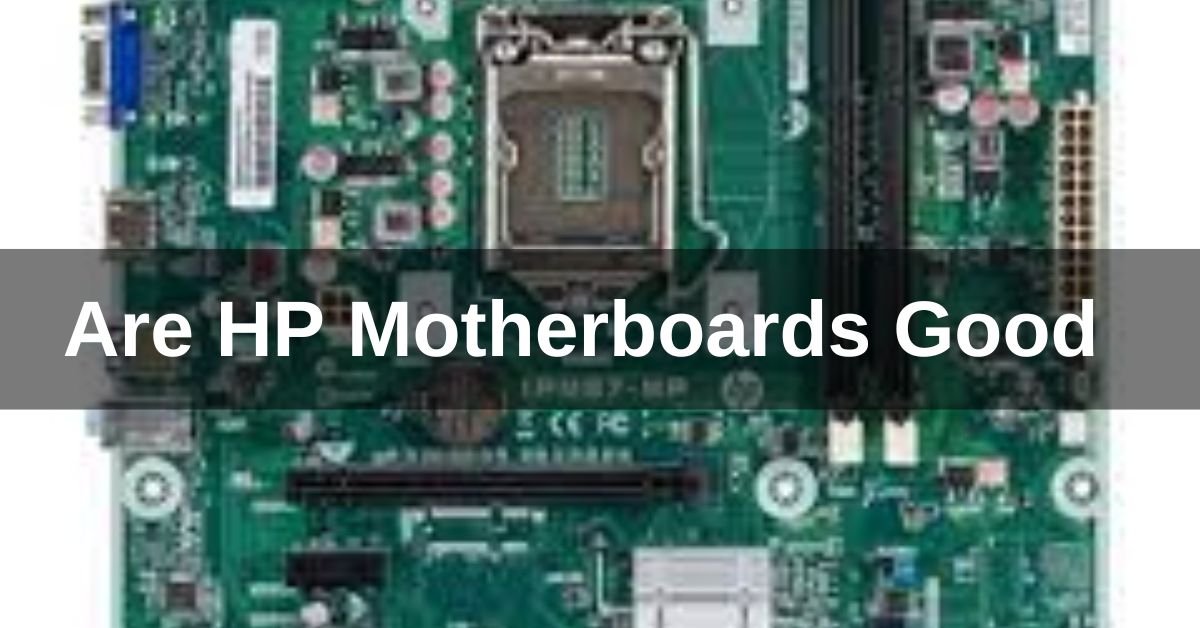When it comes to building or upgrading a PC, one of the critical components to consider is the motherboard. Among the various brands available in the market, HP is a prominent name, known for its range of electronic devices.
Yes, HP motherboards are generally good. They’re designed to work well with HP computers. They’re reliable and compatible, ensuring your computer runs smoothly.
This article delves into the realm of HP motherboards, and also discusses “Are HP Motherboards Good”.
What is a motherboard?
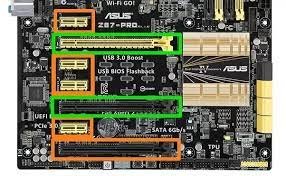
A motherboard is the main circuit board in a computer that connects all the essential components together. It houses the CPU, RAM, storage drives, expansion cards, and provides connectivity for peripherals like keyboards, mice, and monitors.
Understanding the Quality of HP Motherboards
1. Reliability and Durability:
One of the primary concerns when evaluating the quality of motherboards is their reliability and durability. HP motherboards are engineered with high-quality components and undergo rigorous testing to ensure they can withstand the demands of everyday use.
2. Performance:
Performance is another crucial factor to consider when assessing the quality of HP motherboards. These motherboards are optimized to deliver efficient performance, whether you’re gaming, multitasking, or running resource-intensive applications.
3. Compatibility:
Compatibility is paramount when selecting a motherboard for your system. HP motherboards are designed to be compatible with a wide range of processors, RAM modules, and expansion cards, offering users flexibility and versatility in configuring their systems.
Read: Tuf Gaming Motherboard Wifi Not Working – Ultimate Guide!
Comparing HP Motherboards with Other Brands:
To gauge the quality of HP motherboards accurately, it’s essential to compare them with offerings from other brands in the market.
While HP motherboards may not always top the charts in terms of specifications, they often provide a reliable and cost-effective solution for mainstream users.
Read: Does Any Power Supply Work With Any Motherboard – Ultimate Guide!
Customer Reviews and Feedback:
Customer reviews and feedback play a significant role in assessing the quality of HP motherboards.
By analyzing user experiences and testimonials, potential buyers can gain valuable insights into the performance, reliability, and compatibility of HP motherboards.
Read: Can Power Supply Damage Motherboard – Ultimate Guide – 2024
HP Motherboards: Pros and Cons
Pros:
- Reliable and durable construction
- Optimized performance for everyday use
- Wide compatibility with HP systems
- Cost-effective solution for budget-conscious users
Cons:
- Limited overclocking capabilities compared to enthusiast-grade motherboards
- Limited customization options for advanced users
- May lack some high-end features found in premium motherboards
How to choose a motherboard?
To choose a motherboard:
1. Identify your CPU: Ensure the motherboard is compatible with your CPU socket type.
2. Consider form factor: Choose ATX, Micro-ATX, or Mini-ITX based on your case size and expansion needs.
3. Check chipset: Select one with features like USB ports, PCIe slots, and overclocking capabilities.
4. RAM support: Ensure compatibility with your desired RAM type and capacity.
5. Expansion slots: Consider the number and type of PCIe slots for graphics cards and other components.
6. Connectivity: Look for sufficient USB ports, audio jacks, and networking options.
7. Additional features: Consider extras like Wi-Fi, RGB lighting, and M.2 slots based on your preferences and needs.
8. Read reviews: Research user feedback and expert reviews to assess reliability and performance.
Read: What Does Cha Fan Mean On Motherboard – Complete Guide!
How to choose a motherboard for a gaming computer?
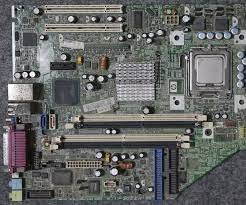
To choose a motherboard for a gaming computer:
1. Consider CPU compatibility: Ensure your motherboard supports your chosen CPU socket type.
2. Check chipset: Select a chipset that offers features like overclocking and ample PCIe slots.
3. Look for RAM support: Ensure it supports your desired RAM type and capacity.
4. Consider expansion slots: Look for PCIe slots for graphics cards and other expansion cards.
5. Connectivity: Choose a motherboard with enough USB ports, audio jacks, and networking options.
6. Form factor: Select a form factor that fits your case and offers the features you need.
7. Read reviews: Research user and expert reviews to gauge reliability and performance.
Best HP Motherboards:
The best HP motherboards vary based on your needs. Look for models with good compatibility, reliability, and features like ample USB ports and expansion slots. Consider factors like chipset and socket compatibility for your processor.
Does HP make their own motherboards?
Yes, HP does not typically manufacture their own motherboards. Instead, they collaborate with third-party manufacturers to produce motherboards tailored to their systems’ specifications and requirements.
Does HP use proprietary motherboard?
Yes, HP often uses proprietary motherboards in their computers. These motherboards are designed specifically for HP systems and may have unique features or configurations tailored to their computers’ needs.
Does a gaming motherboard make a difference?
Yes, a gaming motherboard can make a difference. It’s designed to handle the demands of gaming better, offering features like improved cooling, faster data transfer, and better support for high-performance components.
Read: Do Motherboards Come With Windows – Ultimate Guide – 2024
How important is a good motherboard?
A good motherboard is very important for your computer. It’s like the foundation of a house. It affects performance, compatibility, and upgrade options.
Choosing a reliable motherboard ensures stability and better overall performance for your system.
Are HP motherboards good for gaming?
Yes, HP motherboards can be good for gaming. They offer decent performance and compatibility with gaming components.
However, for serious gaming, you might want to consider motherboards from specialized gaming brands.
HP 8096 motherboard.
The HP 8096 motherboard is a specific model designed for HP computers. It provides the main circuitry to connect components like the CPU, RAM, and storage. Check its specifications for compatibility and features.
HP b550a motherboard.
The HP B550A motherboard is a specific model designed by HP. It typically supports AMD Ryzen processors and features the B550 chipset.
Its specifications include support for PCIe 4.0, multiple USB ports, and other standard motherboard features.
HP Erica motherboard GPU compatibility.
The compatibility of GPUs with the HP Erica motherboard depends on factors like the PCIe slots available, power supply support, and physical space within the case. Consult the motherboard’s specifications for supported GPU types and configurations.
HP Erica motherboard specs.
The HP Erica motherboard specs typically include details such as its chipset, supported CPU types, RAM capacity, expansion slots (like PCIe), ports (USB, HDMI), and form factor (like ATX or microATX).
HP Erica motherboard ram compatibility.
To check RAM compatibility with the HP Erica motherboard, consult the motherboard’s specifications or user manual.
It will outline supported RAM types, speeds, and capacities. Matching these specifications ensures proper functionality and performance.
Are HP motherboards safe?
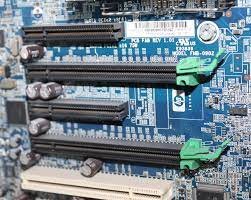
Yes, HP motherboards are generally safe to use. They undergo rigorous testing and meet industry standards for reliability and performance. However, like any electronic component, proper handling and installation are important for safety and longevity.
HP System board (motherboard).
The HP system board, also called the motherboard, is like a computer’s central hub. It connects all components like the CPU, RAM, and storage. The computer must function properly.
Moving HP Motherboard to a new gaming case.
If you’re moving an HP motherboard to a new gaming case, ensure compatibility with the case’s size and layout. Check for enough ports and connectors, and watch out for potential wiring differences. It’s like fitting puzzle pieces together again.
Are there any downsides to using a prebuilt desktop motherboard in a new build?
Using a prebuilt desktop motherboard in a new build may limit customization options and might not accommodate specific needs like gaming or high-performance tasks. It’s like using a ready-made puzzle; it fits, but might not be perfect.
Is HP Omen a good brand for prebuilt gaming PC’s?
Yes, HP Omen is generally considered a good brand for prebuilt gaming PCs. They offer reliable performance, and quality components, and often come with decent support. Many users find them to be a worthwhile option for gaming.
Read: Motherboard 6 Pin Power Connector – Complete Guide – 2024
Motherboard replacement. Are other similar motherboards compatible? How to check?
When replacing a motherboard, ensure compatibility by checking the socket type, chipset, and form factor.
Look for similar motherboards with matching specifications. Consult the manufacturer’s website or use online compatibility tools to verify compatibility before purchasing.
Read: Motherboard Wifi Antenna Not Working – Ultimate Guide – 2024
Does a motherboard affect the performance of a gaming PC?
Yes, the motherboard affects the performance of a gaming PC. It determines which components can be used and how they communicate.
A good motherboard supports faster processors, better graphics cards, and higher RAM capacities, enhancing gaming performance overall.
Does the motherboard brand matter for gaming?
Yes, the motherboard brand can matter for gaming because different brands offer varying quality, features, and compatibility with gaming components like graphics cards and processors. Choosing a reputable brand can ensure better performance and reliability for your gaming PC.
Read: Z690 Motherboard Wifi Not Working – Ultimate Guide – 2024
Can I put a Shuttle XPC motherboard into a HP Pro 3500 case?
No, you cannot put a Shuttle XPC motherboard into an HP Pro 3500 case. Motherboards and cases must be compatible in terms of size, layout, and mounting points. Always check the specifications and compatibility before attempting such a swap.
Does gaming depend on good motherboard?
Gaming doesn’t solely depend on a good motherboard, but it’s important for overall performance.
A good motherboard supports compatible components like CPU and GPU, offers necessary features like expansion slots and ports, and ensures stable performance for gaming experiences.
Read: Are All Graphics Cards Compatible With All Motherboards – Ultimate Guide!
Does the size of the motherboard matter for gaming?
No, the size of the motherboard doesn’t directly affect gaming performance. However, smaller motherboards may have fewer expansion slots and features. Choose a motherboard size that fits your case and supports the features you need for gaming.
Can I use any graphics card with any motherboard?
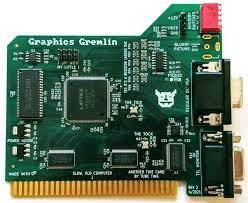
No, you can’t use any graphics card with any motherboard. Graphics cards must be compatible with the motherboard’s slot type (e.g., PCIe) and power supply. Check your motherboard’s specifications and ensure compatibility before purchasing a graphics card.
Read: Dram Light On Motherboard – Complete Guide – 2024
FAQs:
1. Does an HP motherboard fit in a gaming chassis like Thermaltake View 27 or any other?
Yes, An HP motherboard may fit in a gaming chassis like the Thermaltake View 27 or others if their sizes and form factors match. Check compatibility by comparing the motherboard and case specifications.
2. Can any motherboard fit into any case?
Not all motherboards can fit into any case. You must ensure compatibility by matching the motherboard’s size and form factor with the case’s specifications before attempting installation.
3. Would an old PC chassis house a modern motherboard?
Yes, an old PC case can fit a new motherboard as long as they are compatible sizes. You might need to check if the motherboard’s form factor matches the case.
4. How important is it to get a good motherboard when building a gaming PC?
Getting a good motherboard is important for building a gaming PC. It affects performance, compatibility with components, and future upgradability. A quality motherboard ensures stable operation and supports advanced features for gaming.
5. Will a HP Com 8300 CMT motherboard fit in an ATX case?
Yes, the HP Com 8300 CMT motherboard can fit in an ATX case. However, you may need to check for compatibility and make sure that all the screw holes and connectors align properly.
6. Can I replace a Toshiba motherboard with an HP motherboard?
No, you generally cannot replace a Toshiba motherboard with an HP motherboard. Motherboards are specific to each brand and model, and they’re not typically interchangeable between different brands like Toshiba and HP.
7. What motherboard is in the HP OMEN gaming laptop?
The HP OMEN gaming laptop typically uses motherboards designed specifically for its model range. They’re customized to fit the laptop’s form factor and accommodate its performance needs effectively.
8. Can I make a GTX 1070 fit the motherboard of an HP ProDesk 600 G3 computer?
Yes, you can make a GTX 1070 fit the motherboard of an HP ProDesk 600 G3 computer if it has a compatible PCIe x16 slot and sufficient power supply.
9. Is it possible to replace the motherboard of a mini ITX desktop PC like HP 110-400IL?
Yes, it is possible to replace the motherboard of a mini ITX desktop PC like the HP 110-400IL. However, ensure compatibility with other components and consider technical expertise or assistance.
10. Can a gaming PC run on 2 motherboards?
No, a gaming PC cannot run on 2 motherboards simultaneously. Each PC needs only one motherboard to function properly. Using two would cause conflicts and technical issues.
Conclusion:
In conclusion, HP motherboards are generally reliable and compatible options for building or upgrading a PC. They offer good performance, durability, and compatibility with HP systems. While they may not always have the same features as high-end motherboards, they provide a cost-effective solution for mainstream users. It’s important to choose a motherboard based on your specific needs and requirements to ensure a smooth and efficient computing experience.
